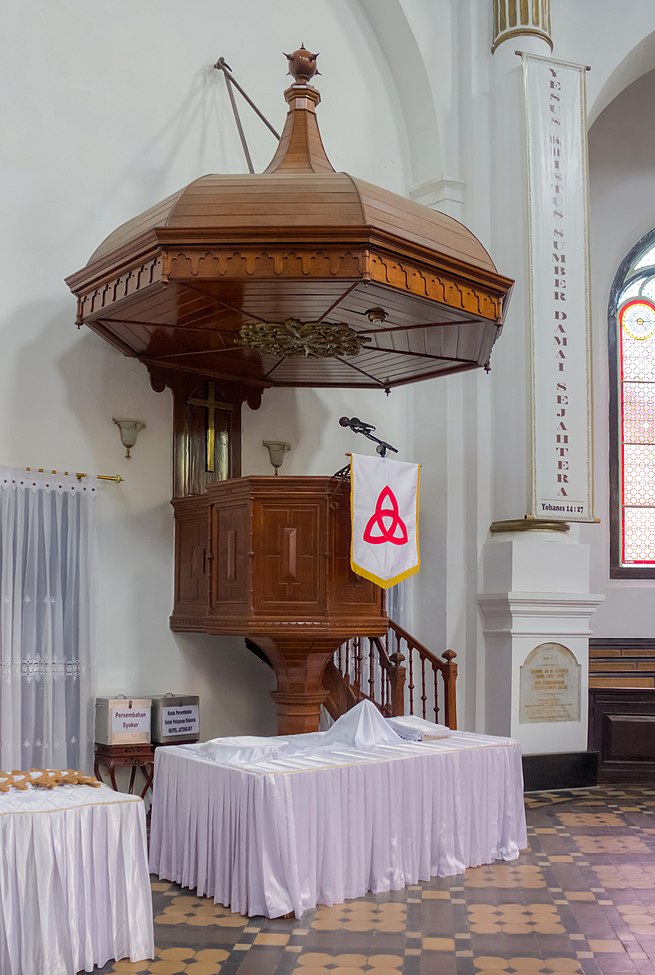
Main Difference
The main difference between Pulpit and Podium is that the Pulpit is a speakers’ stand in a church and Podium is a construction.
-
Pulpit
Pulpit is a raised stand for preachers in a Christian church. The origin of the word is the Latin pulpitum (platform or staging). The traditional pulpit is raised well above the surrounding floor for audibility and visibility, accessed by steps, with sides coming to about waist height. From the late medieval period onwards, pulpits have often had a canopy known as the sounding board or abat-voix above and sometimes also behind the speaker, normally in wood. Though sometimes highly decorated, this is not purely decorative, but can have a useful acoustic effect in projecting the preacher’s voice to the congregation below. Most pulpits have one or more book-stands for the preacher to rest his or her bible, notes or texts upon.
The pulpit is generally reserved for clergy. This is mandated in the regulations of the Roman Catholic church, and several others (though not always strictly observed). Even in Welsh Nonconformism, this was felt appropriate, and in some chapels a second pulpit was built opposite the main one for lay exhortations, testimonials and other speeches. Many churches have a second, smaller stand called the lectern, which can be used by lay persons, and is often used for all the readings and ordinary announcements. The traditional Catholic location of the pulpit to the side of the chancel or nave has been generally retained by Anglicans and some Protestant denominations, while in Presbyterian and Evangelical churches the pulpit has often replaced the altar at the centre.
Equivalent platforms for speakers are the bema (bima, bimah) of Ancient Greece and Jewish synagogues, and the minbar of Islamic mosques. From the pulpit is often used synecdochically for something which is said with official church authority.
-
Podium
A podium (plural podiums or podia) is a platform used to raise something to a short distance above its surroundings. It derives from the Greek πόδι (foot). In architecture a building can rest on a large podium. Podia can also be used to raise people, for instance the conductor of an orchestra stands on a podium as do many public speakers.
Common parlance has shown an increasing use of podium in American English to describe a lectern.
In sports, a type of podium is used to honor the top three competitors in events such as the Olympics. In the Olympics a three-level podium is used. Traditionally, the highest level in the center holds the gold medalist. To their right is a somewhat lower platform for the silver medalist, and to the left of the gold medalist is an even lower platform for the bronze medalist. At the 2016 Summer Games in Rio, however, the Silver and Bronze were equal in elevation. In many sports, results in the top three of a competition are often referred to as “podiums” or “podium finishes”. In some individual sports, “podiums” is an official statistic, referring to the number of top three results an athlete has achieved over the course of a season or career. The word may also be used, chiefly in the United States, as a verb, “to podium”, meaning to attain a podium place.
-
Pulpit (noun)
A raised platform in a church, usually enclosed, where the minister or preacher stands when giving the sermon.
-
Pulpit (noun)
Activity performed from a church pulpit, in other words, preaching, sermons, religious teaching, the preaching profession, preachers collectively or an individual preaching position; by extension: bully pulpit.
-
Pulpit (noun)
A raised desk, lectern, or platform for an orator or public speaker.
-
Pulpit (noun)
The railing at the bow of a boat, which sometimes extends past the deck. It is sometimes referred to as bow pulpit. The railing at the stern of the boat is sometimes referred to as a stern pulpit; other texts use the perhaps more appropriate term pushpit.
-
Pulpit (noun)
A bow platform for harpooning.
-
Pulpit (noun)
A plane’s cockpit.
-
Podium (noun)
A platform on which to stand, as when conducting an orchestra or preaching at a pulpit.
-
Podium (noun)
A stand used to hold notes when speaking publicly.
-
Podium (noun)
A steepled platform upon which the three competitors with the best results may stand when being handed their medals or prize.
-
Podium (noun)
A result amongst the best three at a competition.
-
Podium (noun)
A low wall, serving as a foundation, a substructure, or a terrace wall.
-
Podium (noun)
The dwarf wall surrounding the arena of an amphitheatre, from the top of which the seats began.
-
Podium (noun)
A foot or footstalk.
-
Podium (verb)
To finish in the top three at an event or competition.
“The swimmer podiumed three times at the Olympics.”
-
Pulpit (noun)
a raised enclosed platform in a church or chapel from which the preacher delivers a sermon
“many ministers delivered political guidance from their pulpits”
-
Pulpit (noun)
religious teaching as expressed in sermons
“the movies could rival the pulpit as an agency moulding the ideas of the mass public”
-
Pulpit (noun)
a raised platform in the bows of a fishing boat or whaler.
-
Pulpit (noun)
a guard rail enclosing a small area at the bow of a yacht.
